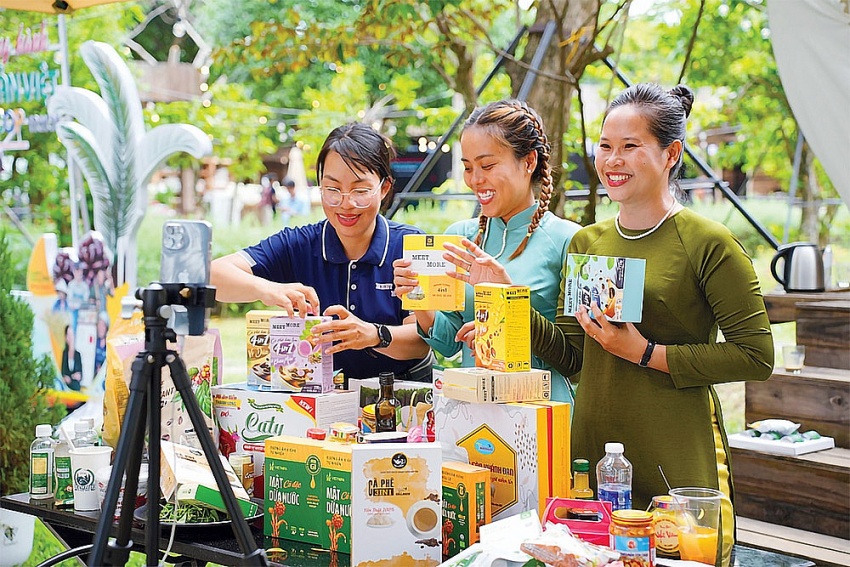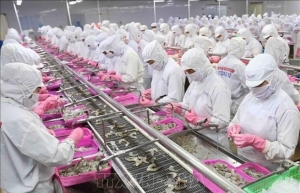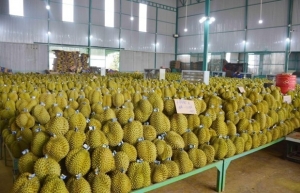Agricultural produce seeks to conquer e-commerce market
With the capacity to produce several thousand tonnes of clams each year, Minh Phu Trading and Services from the northern province of Thai Binh identifies both the domestic market and China.
Director Tran Ngoc Thuy said doing business on e-commerce platforms is in the interests of many businesses, and Minh Phu is no exception.
“Currently, there is still a lot of potential for consumption of clams in the Chinese market. We will take advantage of this opportunity to expand the market, increasing export output by five-fold by the end of this year,” Thuy said.
 |
| Vietnamese local products are finding their way to more diverse markets, photo Le Toan |
Before participating in e-commerce, each month Minh Phu could only export about 20 tonnes of clams to China. But since participating in the Vietnam booth on Alibaba.com from early last year, the company’s export capacity has tripled.
The Vietnamese agricultural products booth was born from cooperation between the Ministry of Industry and Trade (MoIT) and Alibaba, with the goal of introducing suppliers, promoting, and increasing consumption of Vietnamese products to the Chinese market.
E-commerce is an important channel for agricultural products, and is also one of eight priority areas for digital transformation to support farmers in improving product value and saving costs.
Vu Ba Phu, director of the Vietnam Trade Promotion Agency under the MoIT, said that every day, a Vietnamese supplier of agricultural and aquatic products on an e-commerce platform will have the opportunity to contact more than 450 new buyers each month.
“Suppliers through e-commerce will have the opportunity to connect with international customers, export to many new markets and thereby achieve outstanding growth,” Phu said.
According to Qi Ping, general director of Sunwah Gelafood Supply Chain Management, production capacity, quality products, and competitive prices are all factors helping Vietnamese agricultural products create a strong reputation with international customers, especially the Chinese market.
“Many Vietnamese products have changed their designs and packaging, improved their images, and met the standard requirements of export regulations. They are suitable for consumer preferences and needs on e-commerce platforms,” said Ping.
Sunwah Gelafood operates online and brick-and-mortar stores, under what is known as the Vietnam Pavilion on China’s public e-commerce platforms, e-commerce platform ASEAN Mall, physical stores, and Vietnamese warehouses in China.
Ping said that China was the country with the fastest e-commerce growth globally, with about 1.3 billion internet users and the highest number of people participating in online purchases and mobile payments worldwide.
“The scale of the Chinese e-commerce market is expanding. This is the path that Vietnamese export businesses can take advantage of to maintain their position as China’s largest trading partner in ASEAN,” she added.
Several bottlenecks
Although e-commerce is becoming increasingly popular, to achieve efficiency on these platforms, agricultural businesses still have difficulties that need to be resolved.
According to Pham Ngoc Anh Tung, founder of agricultural platform Foodmap, consumer purchasing decisions depend on convenience, price, and product brand. Although e-commerce meets these three factors, applying it to agricultural business, especially fresh vegetables, has many difficulties.
“In the fresh agricultural industry, the time from importing to sale is very short. If this time is extended, the quality of the product decreases. The best way to solve the problem is to have close coordination between units, from suppliers to shipping units,” Tung said.
Suppliers need to invest heavily in infrastructure, including cold storage and special transportation facilities, Tung added. “Delivery within three or four hours while still ensuring quality is a challenge for the fresh agricultural industry. In addition, predicting the number of goods to be sold compared to market demand is also critical.”
The challenge when doing business on e-commerce platforms comes from taking a lot of time to post products and update information. While each business will own many different products, each product has different detailed information.
“The ability to apply IT to smaller enterprises and cooperatives is still limited. Our problem is the lack of human resources that are knowledgeable about e-commerce, leading to ineffective maintenance of booths and reaching customers,” said Le Van Tam, director of Red River Agricultural Service Cooperative.
Meanwhile, Ping from Sunwah Gelafood commented that Vietnamese businesses need to learn about the purchasing preferences of each market to have effective ways to convey information and achieve better results.
“Short videos ranging from a few seconds to a few minutes, are a daily source of information favoured by nearly one billion Chinese people. In addition, the livestream sales model will promote direct sales and expand the consumer market more effectively,” she said.
Positive outcomes
According to the MoIT, Vietnam is becoming an important link in the global agricultural value chain, and is among the top 15 largest agricultural exporters in the world and second in Southeast Asia.
In recent years, the ministry has continuously cooperated with foreign e-commerce platforms to promote market diversity, support domestic agricultural enterprises to improve sales, and seek out the tastes of potential export markets.
In November 2023, the MoIT implemented the Vietnam Pavilion programme on Alibaba, in which agricultural products, food, and beverages have been in the top 10 best-selling items.
Last March, the One Commune, One Product (OCOP) Market initiative, under the framework of cooperation with TikTok Vietnam, successfully brought OCOP items and typical agricultural products of many localities to domestic consumers.
After one year, OCOP Market had witnessed more than 800 livestream sessions, bringing in more than $4.2 million in revenues and supporting more than 3,000 items.
Previously, the agency also cooperated with Amazon Global Selling to support Vietnamese businesses exporting goods on Amazon.com. The export value of Vietnamese businesses on the platform increased by 50 per cent last year, with about 17 million products sold to Amazon customers globally.
Although agricultural products are not yet in the top five best-selling items on Amazon, this platform predicts it will have a lot of room to continue growing in the near future.
In the domestic market, agricultural products of many localities are also regularly supported and promoted on major e-commerce platforms such as Shopee, Lazada, Sendo, and Postmart via the national online Vietnamese Pavilion programme, Vietnamese agricultural products market, and the annual Vietnamese agricultural products week.
| Mike Zhang, head of Vietnam Business, Alibaba.com
Alibaba, the MoIT, and the Vietnam Trade Promotion Agency commenced the registration period for Alibaba’s Vietnam Pavilion in November 2023. This marks the initiation of the selection of 100 outstanding businesses to participate in the online pavilion. The objective is to spotlight the diverse range of Vietnamese-made goods and feature reputable businesses and brands from Vietnam, with the goal of enhancing the global visibility of high-quality domestic products. Meanwhile, the initiative aims to facilitate international trade, fostering a deeper understanding of Vietnamese products and small- and medium-sized enterprises (SMEs) among global buyers. Alibaba actively supports Vietnamese exporters by providing access to a global trade e-commerce platform that reaches over 190 countries. We facilitate essential services like international payments and brand building, empowering Vietnamese businesses to effectively connect with and cater to a global audience. In 2024, Alibaba will continue to invest in the Vietnamese market, unveiling new products and services specifically tailored for Vietnamese businesses. Furthermore, we will continue to offer an abundance of training and market insights, as well as personalised one-on-one coaching and consulting services. By providing more hands-on guidance, we aim to empower SMEs to trade globally with effectiveness. Recognising Vietnam as a burgeoning manufacturing hub and a top global exporter of several key products, we plan to diversify our platform’s offerings to assist Vietnamese SMEs in promoting and strengthening their international brand presence. Nguyen Lam Thanh, representative, TikTok Vietnam
Promoting agriculture and local speciality products such as OCOP is a key focus of TikTok Shop. We embark on the OCOP journey with the participation of many content creators and other partners to collectively spread the stories of Vietnamese specialities and products from craft villages to domestic consumers. After one year, thousands of users have been trained in digital skills to bring their products to sell on the platform. The hashtag #OCOP alone has attracted up to 1.4 billion views, creating a wave of certified and labelled items, attracting millions of trusted buyers using genuine and high-quality Vietnamese speciality products. In 2024, we will collaborate with sellers to bring products that are better packaged for the e-commerce environment, helping goods reach consumers at a more reasonable cost. We are also considering how to bring OCOP items to consumers worldwide, especially in large markets such as China, Thailand, Indonesia, and Singapore. We also expect more partners to accompany us on the journey of promoting Vietnamese agricultural products. In 2024, it is estimated that the number of trained e-commerce sellers on the platform could increase to around 9,000-12,000 individuals, 3-4 times higher than last year if we receive the support of our partners. In addition, TikTok also regularly organises training courses for sellers and content creators, establishes pricing policies for users, especially for domestic products. As part of these efforts, the new OCOP Seedling programme will be launched to promote and nurture new sellers on the platform. Sellers will receive direct support from TikTok experts and partners within our ecosystem. We expect that through the seedling programme, at least one outstanding seller will be developed in each locality, enabling them to share the stories of their unique speciality products from different regions nationwide with consumers. Gijae Seong, CEO Amazon, Global Selling Vietnam
To succeed in the agricultural sector, sellers need to understand the international customers’ needs and build a brand story for their products. Branding agricultural products is essential for enhancing their sustainability and achieving strong growth in the cross-border e-commerce arena. In recent years, Vietnamese agricultural products such as rice, coffee, cashews, and rice paper have been available on Amazon. However, they have not yet achieved high rankings. Recently, brands such as LAFOOCO cashews and Trung Nguyen’s G7 coffee have achieved some success, contributing to the expansion of Vietnam’s agricultural product portfolio on Amazon. In addition to challenges related to quality standards, regulations, and policies of target markets, the agricultural product sector also faces various other challenges. Agricultural products are often associated with a specific expiration date. Therefore, both suppliers and consumers need to consider factors such as transportation time, storage duration, and sales cycles. These aspects are crucial and require careful attention. The second challenge lies in the cost of transportation and storage. Retailers must calculate to determine an appropriate price when distributing a 5kg bag of rice, while still balancing the costs of transport and storage. We have observed that some sellers are currently opting to sell premium, organic agricultural and food products to balance weight, transport costs, and appropriate pricing when entering the market. Thirdly, most Vietnamese agricultural producers and exporters have established significant distribution channels in markets such as the United States and Europe, often including agreements for product distribution through these channels. Therefore, to sell on the Amazon platform, businesses often have to choose a distinct product or build a separate brand for their products. This process requires time and investment from the sellers. |
 | Agricultural exports make solid mark in first quarter Vietnam counted a 21.8 per cent jump on-year in agricultural, forestry, and fishery export value in Q1, continuing a stellar performance for the export picture of the country. |
 | Vietnam’s agricultural products appeal to foreign customers Vietnam's agricultural products were sold well in foreign markets in Q1, with a surge in both volume and prices documented. |
 | E-commerce platforms help to spread agricultural value E-commerce is opening up a dynamic global playing field and bringing more opportunities for Vietnamese agricultural products. Nguyen Minh Tien, director of the Ministry of Agriculture and Rural Development’s Trade Promotion Centre for Agriculture, explained more to VIR’s Tra My. |
What the stars mean:
★ Poor ★ ★ Promising ★★★ Good ★★★★ Very good ★★★★★ Exceptional
Related Contents
Latest News
More News
- A golden time to shine within ASEAN (February 19, 2026 | 20:22)
- Vietnam’s pivotal year for advancing sustainability (February 19, 2026 | 08:44)
- Strengthening the core role of industry and trade (February 19, 2026 | 08:35)
- Future orientations for healthcare improvements (February 19, 2026 | 08:29)
- Infrastructure orientations suitable for a new chapter (February 19, 2026 | 08:15)
- Innovation breakthroughs that can elevate the nation (February 19, 2026 | 08:08)
- ABB Robotics hosts SOMA Value Provider Conference in Vietnam (February 19, 2026 | 08:00)
- Entire financial sector steps firmly into a new spring (February 17, 2026 | 13:40)
- Digital security fundamental for better and faster decision-making (February 13, 2026 | 10:50)
- Aircraft makers urge out-the-box thinking (February 13, 2026 | 10:39)




 Tag:
Tag:













 Mobile Version
Mobile Version